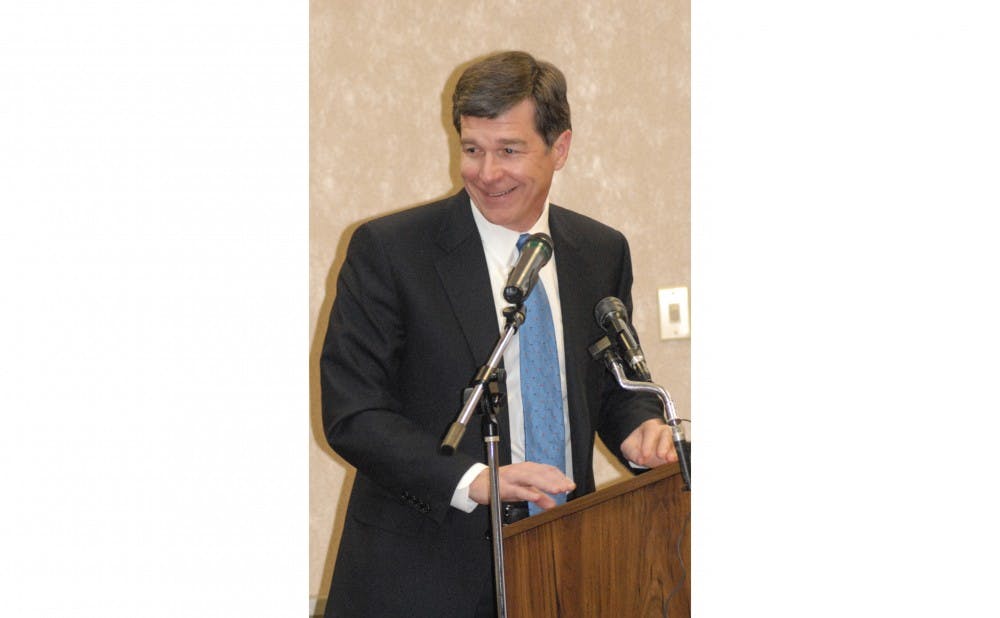If Democrat Roy Cooper is confirmed as governor, professors say he will be almost completely powerless for at least one year.
Although Cooper has already declared victory in the gubernatorial contest, incumbent Republican governor Pat McCrory has not conceded. McCrory has also filed several protests with the State Board of Elections—all of which have been rejected except for a recount in Durham County, which must be completed by 7 p.m. Monday. Even if Cooper wins after the recount, it might not mean too much for North Carolina's future.
“Electing Cooper, as a Democratic governor, would have almost no consequences on public policy,” said John Aldrich, Pfizer-Pratt University professor of political science. “The governor will have a state address where he'll outline an agenda of things he'd like to try to get accomplished. None of that will happen, almost certainly.”
A federal district court last Tuesday ordered new elections for the General Assembly to take place in 2017, because it said the current districts were the result of racial gerrymandering—the process of manipulating district boundaries for partisan gain. This followed an August ruling ordering the legislature to redraw 28 of the state's 170 state House and state senate districts. During the last two elections, both houses of the legislature have maintained Republican supermajorities, giving them significant powers.
After the 2016 elections, Republicans controlled 74 seats in the state House compared to 46 Democrat seats. Similarly, Republicans maintained their supermajority in the state Senate with 35 seats to the Democrats' 15 seats.
By controlling more than three-fifths of both the North Carolina House and Senate following the 2012 and 2014 elections, the Republicans gained the ability to override any veto by the governor. Even during Republican Governor Pat McCrory’s term, the legislature overrode some of his vetoes.
McCrory had vetoed, for example, a bill that would have allowed government officials not to perform same-sex marriages if they had strong religious objections. The legislature promptly overrode his veto, making the bill law.
“If [the Republican legislature] wants to do something, they can do it and there's nothing the Democrats can do to stop it essentially,” Aldrich said.
Even without a supermajority, Aldrich said that Cooper's powers would be more limited than those of other state governors due to the presence of a separately-elected Council of State sharing executive power. The state's constitution was designed to leave the governor with weak powers, he noted, adding that the individual serves more as a party leader.
However, the legislative elections in 2017 and 2018 offer Cooper an earlier opportunity “to try and at least break the supermajority," Aldrich said. Still, he noted it would be a difficult task for the Democrats.
“These are elections that are historically extremely low turnout. It's a much more Republican electorate because of that,” Aldrich said. “So it's a high bar for the Democrats to cross to be able to have a really big change.”
Jonathan Mattingly, professor and chair of the mathematics department, has conducted research on the gerrymandering of North Carolina’s United States House of Representatives districts. He noted that computer-generated random redistricting affirmed that gerrymandering skewed the popular vote and misrepresented the state’s electorate.
“You can't just say that North Carolina is this way because clearly we're much more evenly split between different opinions,” he said. “This is a state that when it was without districts, elected its governor apparently by about 10,000 votes. So it's not that that's how the state is; that's how the districts were constructed.”
Similarly, Aldrich said the presidential election provided further evidence for how the state was not predominantly Republican.
“We're about 50-50 in a general presidential election, but then 10/13th of the congressional delegation is Republicans,” Aldrich said. “It's really asymmetric and that's sort of a reflection of how skewed the population distribution and gerrymandering is. And that's the same thing at the state legislative level.”
Mattingly agreed that state legislature gerrymandering was similar to the gerrymandering of North Carolina’s U.S. House districts. Gerrymandering in North Carolina arises due to what Mattingly called “uneven distribution," which "packs all the Democrats” into districts that were already solidly blue.
“Since African Americans predominantly vote Democrat in North Carolina, putting African-Americans into one district is the same as putting Democrats in that district.” Mattingly said. “So that led to districts with huge percentages of Democrats.”
In the 2016 presidential election, exit polls showed that nationally, 88 percent of African American voters selected Democrat Hillary Clinton, compared to 8 percent for Republican Donald Trump. Although the court only ordered redistricting for 28 districts, Aldrich noted that districts on their borders will also be impacted during the redrawing process.
“They're mostly saying that the high concentration Democratic voters in African-American districts has to change,” he said. “So those 28 have to change and they have to get white voters from some place else.”
For people looking for a decision that would have a greater impact on redistricting, Aldrich estimated that there is only a “two percent chance” a judge would consider simply partisan, not racial, motivations to be illegal. There's no legal standing to make such a decision, he said.
The large number of incumbent seats held by both parties due to gerrymandering fundamentally hurts the functions of a democracy, Mattingly said.
“The responsiveness of government is what gerrymandering also defeats,” he said. “[Partisanship] comes from gerrymandering.”
Get The Chronicle straight to your inbox
Signup for our weekly newsletter. Cancel at any time.

